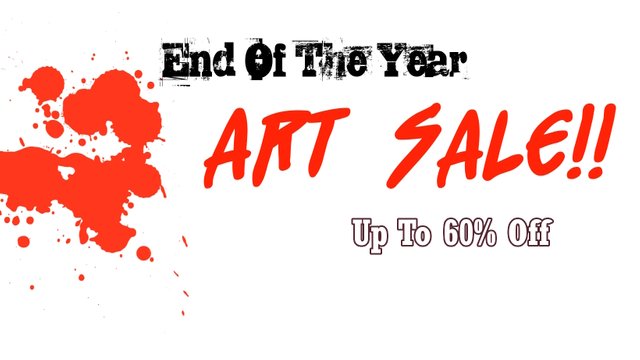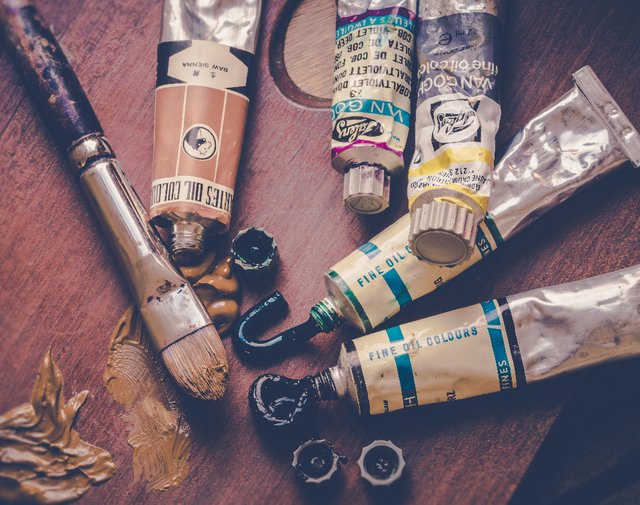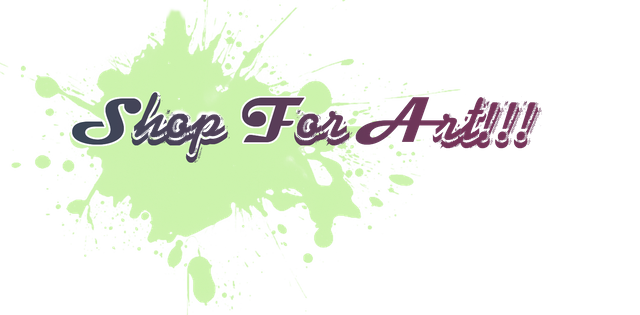As An Artist How to Improve the Commission Process For You and Your Clients
As an Artist, How to Improve the Commission Process for You and Your Clients
Yesterday I made a lengthy post about how to get the most out of commissioning an artist. Today I would like to talk to the artists out there specifically about how to give your clients the most to make sure that when they need a creative solution they feel 100% comfortable seeking your expertise and will gladly pay for it.
Most Clients are Mostly Clueless
Consider art from the eyes of most art patrons. Art seems to be some magical process where people that are automatically gifted with some seemingly wizard like abilities just make an image appear in the most pleasant and fulfilling way. They don’t know about all the decisions that have to be made and how mentally strenuous creating art can sometimes be. They don't know the info that you need for you to give them what they want.
Communication Is Key Make Yourself Easily Accessible

Communicate on Their Level
We live in a time where we can communicate and share ideas and images instantly to people on the other side of the world. If you art business plan isn't invested convenience of communication then you are messing up. You should make yourself available across multiple platforms so that clients can reach out to you on whatever platform is the most comfortable for them.
Hold this in the front of your mind always when dealing with a client: You are the one with experience in art. That is your mental space and perception. You are selling not just a product, but an experience. The experience is completely new for most people, and they don't even know where to start. Make it a pleasant and exploratory experience for them. Let them in the process by asking for their input and communicating through their preferred platform.
Learn as Much as You Can
Learning the reason someone wants to commission you, their intention with the art, their expectations for the project, their deadline, their personality and experiences, will all payoff in the end product and experience. There are lots of things most artists never think to ask because they are too excited that they got the commission, like, "Is this a gift for someone." That is a very important question, because if you post an image or live video of you working on it and end up ruining the surprise for the recipient, how do you think the client will feel about
Don’t assume that your client should know even the most basic of information about what goes into the process. Until they show otherwise assume they know absolutely nothing. Not only do potential clients not know, they don’t even know of the things that they don’t know to have any general idea of what questions they should be asking.
You need to lay it all out for them. This is why I developed a Hire Me page with information on what takes place during the commissioning project along with a FAQ section. This way people can go learn a little more about the process on their own time without having to ask me a million questions which sometimes makes people feel insecure, stupid, or less than.
A Commission is a Partnership
The environment you want to create for your clients is one of partnership in this project. They shouldn’t feel like they are an insect climbing a mountain to consult some god or guru, or like they are sitting on the outside looking in. Always be helpful, patient, honest, and straightforward. You are not just selling art, you are building relationships that need to be founded on trust. Clients need to know that you are trustworthy, and that you are truly looking for a mutual relationship and not a one way street where only you win.
Finding and Managing Expectations
You want the client to feel comfortable asking questions so let them know that not only is it okay it is pretty much what you hope for and expect. If they are asking you questions and you are asking them questions that means that you are working together to clarify the goals of the project. This continuously pulling you together and getting you on the same page. Make it your goal to never assume anything. When you do this you are minimizing the probability of either of you being displeased.
Some clients will want to just hand you the reigns and say you decide, you are the artist or I trust your judgement. This is okay for certain aspects of the project, but to simply take the reigns on the entire project can be very dangerous. Your idea and their idea of the goals of the project can be drastically different. So if you are going to take complete control they need to understand this. It is your job to manage expectations for the project
My suggestion is that you inform them that clients are generally more satisfied when they provide input and share expectations. Why I say this is because there are some people that will tell you just sort it out, but once you are done with the process they will pick apart all the things that you did that they don’t approve of. You can usually avoid this if you involve them in the decision making process from the beginning.
Getting their input can be the difference in a satisfied and an unsatisfied customer in the end, and trust me, unsatisfied customers are your worst marketing nightmare. You might as well spend thousands of dollars putting out advertisements that say hi everyone I am an asshole and a tool; don’t hire me for anything. Wait actually that might be better advertising than an unsatisfied client.
When To Show the Client Your Progress
Involving the client in the process is about more than just talking; it involves showing them the work as it progresses. This is a huge trust builder. Don't leave them lying awake at night wondering if you are doing anything or if you are doing it like they want, or if you are going to make the deadline. Put their worries at ease. They love knowing that you are involving them in the creative process. It feels like they really had a hand that way.
So show them, but when should you show them? That really depends on your process in particular. Showing your client your work too soon can be a bad idea. I am never happy with the way my art looks in the beginning. Sometimes it even makes me question my ability and I will literally have to look at past successful projects to realize that they always look like crap to me in the beginning. Showing a client too soon might make them lose faith in you, but even more likely than that it will just create a lot of unnecessary criticism.
Like I said most of your clients are going to be familiar with the process. They usually tend to think it just sort of appears magically. So when they see the chaotic state of your initial marks they might start to question your ability, and start suggesting all sorts of changes. Remember they are talking about what they are seeing in the picture while you are referencing its potential, or what it will be. So I will take pictures of the whole process, but usually don't start sending them until at least some part of the work begins to look like something. This will all vary from artist to artist
Again, commissioning artwork is a very new experience for most people. It is one of those make or break moments. Treat them right and you can create a new art enthusiast, but if you leave them with a sour taste in their mouth they may never try to commission art again from anyone. If that is the case, you haven’t just lost a client, and the art world in general has lost a potential patron.
Don't Get Burned

Get Your Payment Up Front
Learning to not get burned can be a painful lesson or you can just learn from the rest of us burn victims. First thing to realize is that you need to be paid for your services, at least in part, before you ever start. I take anywhere from 33% to 100% payment up front before I ever lift a finger.
There are expenses of time and supplies on your end even if the client backs out on the sale. If you didn't get money up front and they decide to back out then you are left with the burden of the expenses. Another reason payment up front is a good thing is the client feels more invested in the process, and by taking the leap of faith to trust you by giving you money and temporarily having nothing in return, other than your contact information, they trust you even more in the long run.
Depending on the project you might even want to have the client sign a contract outlining what, how, and when you will produce for them and what, when, and how they will pay you. It actually makes the most business sense to do this for every project, but sometimes you can use your own discretion and figure out if it is necessary. It is probably a good idea for large projects with high costs and a huge time investment as well as with clients you don't quite feel right about, but not enough to deny the project.
A lot of the time friends will want to pay you less or pay you later. If you decline them they usually say something like, "....but I thought we were friends." Most don't realize that the reason most of us had to develop a pay before you play policy is because of friends not strangers. Keep this in mind when someone tries to pressure you into making the decision to accept less or accept later. Would that friend be willing to negotiate their wages at the end of a work week or accept payment for their work at an undefined later date? You can bet not.
When you get yourself involved in situations like that you can ruin relationships and find out that when you confront someone about doing you wrong they will get offended, take no accountability, and start to spread hate about your operation. It seems like it wouldn't happen, but trust me it will. People tend to want a better deal and tend not to take accountability for their actions so if the situation blows up it will be your fault even if it is not. It will drive you mad especially considering the entire situation could have been avoided in the first place by simply putting a few smart business plays into practice.
If You Open Your Prices To Negotiation You Better Break Out the Burn Cream
A funny thing that I learned while working in sales is that allowing the opportunity for haggling is bad for business, not simply for your profit on any specific sale, but your operation in general. You might think that if you give someone a price and they were able to talk you into doing it for a lower price that make them happy. Well not really. It diminishes trust, diminishes value, and can actually lead to the person thinking that they didn't get a good enough deal. You might be thinking, "WHAT???????" , but really.
Let's just say you do a portrait drawing for Sam for $200, and he is pleased with the service and the product and wants you to more art for him in the future. Then for whatever reason Billy comes along and wants a portrait that is similar to Sam's on all accounts, but he only wants to pay you $120. After negotiating for a while you decide that you will do the portrait for Billy for $135 which is about a 33% discount.
Well shit, now look what you have started. Since you didn't stand confidently by your price the value of your service comes into question, and it should. So then you finish the $135 drawing for Billy and he is pleased with the outcome, but he actually feels like he got a bit of a raw deal. There is something that happens when you come down on your price; it leaves Billy wondering if he could have got an even better deal if he would have held out or started lower. So instead of him being excited about the $65 he saved he is disappointed by the unknown amount of money that he could have potentially saved if you would have come at you different. Now ain't that about a bitch?
So let's see the reach of this decision. You lost $65, Billy is shaken by the money he could have saved, and he values the art less. Now let's say Billy goes and shares his new work of art on social media and happens to post the price. Billy's Sister is married to a guy that works with Sam's wife's cousin or whatever, and through the web of social networking it comes to Sam's attention that Billy had almost the same project done for $65 less. Now Sam feels jilted. He is thinking you just gave him the shaft. He looked and you weren't having a sale so he deduces that either you shafted him or gave this other guy a much better deal. Now Sam feels like the art you did for him has less value, he feels that he has less value to you as a client, and all those good feelings he had that made him want to work with you again in the future have now started floating away.
So by thinking that you were doing someone a favor you have diminished the value of your work and perhaps lost some clients. Do you know what unsatisfied clients do? They tell everyone how unsatisfied they are. So now you have turned your most effective and cheapest advertising strategy against you over saving one person $65. Some of you might be thinking, but I need to sell work to make money. Yes you do which is why this is a bad idea. You are messing up your brand image and trust. Don't do it. It will cost you way more money in the long run.
Instead a better solution would be to offer other options. This is what I tell people, "My prices are non-negotiable. However my terms are negotiable." What I mean by that is , "It costs what it costs, but sometimes it is possible to tailor the project to fit into a clients budget." The only time someone gets a lower price on a commission than someone else is during a promotional sale that I might have, like the End of The Year Sale I am currently having in my store or if they are a part of my Preferred Customer List which is for people that have commissioned me for work multiple times.
So in short, giving into a clients desires doesn't always lead to a happy customer. There are multiple other examples of this like if you know a client wants a highly detailed portrait painting but they choose a canvas size for the project that basically leads the face to be not much bigger than a quarter, how pleased do you think they will be with the outcome. Not very pleased. They will look at it and say there isn't enough detail or it isn't an accurate likeness. They don't realize that what they are asking you to do isn't realistic. It is your job to learn what a client's expectations are, but it is also your job to manage their expectations as well. You are, most of the time, the only one in the conversation with any expertise.
Turning Projects Down Can Make You Even More Money
How do you find out if the project is right for you? Through experience and learning the right questions to ask. Asking the right questions can tell you if the project isn't a good fit or if the client is just a problem person to begin with. Some people are never pleased. Don't let them put a scar on your business. You are trying to build a reputation that way people will eventually start seeking you out.
Learn to say no. Sometimes telling people no leads to them having an overall better experience in the long run. You don't have to take every job that you get offered. I know in the beginning everyone wants to, but this can actually hurt your growth as a business. Learn to spot problem people. They can ruin your business image. They are usually hateful, negative, and never satisfied with anything. They are not to be confused with a customer that is simply highly particular.
Highly particular customers will usually let you know exactly what they want and don’t leave you wondering about what their expectations are.
You choose your price point. You choose your subject matter. You choose your media. I'm not saying don't explore new things, but taking a commission that is already putting a bad taste in your mouth before it starts will probably turn out bad for both you and the client. If that is the case it can end up damaging your reputation as an artist.
Turning down sales can help you in the long run. Knowing that not everyone that wants to hire you gets to hire you adds value to your operation. People want to be on the short list. Think about V.I.P., Backstage Passes, Elite Clubs. Remember you aren't just selling a product, but also a service, and a feeling.
I Know That Was Long So Here is a Recap
- Most Clients are unfamiliar with the process and don't know the information that you need in order to give them what they want
- It is your job to find out what their expectations are for the project and manage their expectations
- Ask questions and encourage them to ask questions
- Offer them resources to better understand
- You are not just offering a product, but also an experience and a feeling
- Communicate on a platform that is comfortable for them
- Partnership and trust are key to a successful project and long term relationship with clients
- Send Pictures of Progress and let them know their input matters
- Learn to say no
- Take money up front
- Know when to introduce a contract
- Learn the difference between a problem customer and a particular one
- Stand by the value of your service
- Be Flexible
- Sometimes turning down projects leads to more money
Make Sure and Follow For Tomorrow's Post About Building an Art Business from Scratch
All images are linked to their source. Also, I'm sorry if this post seems unedited. I just wrote it on the fly, and it is basically a rough draft for a larger resource I am working on for artists. Please Comment with any feedback or questions. If you found this of value then upvote and/or resteem. If these posts actually start making legitimate money then I will probably just offer the final and revised product to everyone here for free.
Don't Forget to Checkout My Huge End of the Year Sale

If you enjoyed this post I hope you upvote, resteem, and follow me. Comment with any insights, suggestions, questions, or complaints.
You Get What You Pay For- How To Get The Most
Latest Commission- Charcoal Drawing
Latest Commission In the end of the Year Art Sale. See How Much You Can Save
Pelicans in the Sun- A Photo Series Of Last Night's Sunset
GREAT NEWS!!! Huge End of the Year Art Sale, and I am now accepting Steem and Steem Dollars
Portrait Painting Tutorial- A Walk-through of the "Cereal Killer" Oil Painting Series
Sketching on the Graveyard Shift- A Collection of Portrait Sketches
Photo Realism- Why I Am Done Simply "Recording" Images
Fluid Paintings Round 3 (with video)
W.I.P.- Oil Paint Portrait I am Working On
Migraine Madness- A Series of Oil Paintings Portraying Migraines
Fluid Paintings Round 2 (With Video)
Abstract Explosionism- Painting With Guns (With Video)
Fluid Paintings Round 1 (With Video)
Picking the Best Photo for Your Portrait Painting
 |
 |





Congratulations @art-mess, this post is the second most rewarded post (based on pending payouts) in the last 12 hours written by a User account holder (accounts that hold between 0.1 and 1.0 Mega Vests). The total number of posts by User account holders during this period was 2514 and the total pending payments to posts in this category was $2743.93. To see the full list of highest paid posts across all accounts categories, click here.
If you do not wish to receive these messages in future, please reply stop to this comment.
thank you this is very useful information, for business progress and career
@art-mess
Thanks for reading. I'm glad you found it useful.
Hi it was really a great post.
I Resteemed& Upvoted
Yeah post was bit lengthy but really impressive, each and every topic was well defined. Thank you very much
I am also an artist and it was really beneficial for me. I am also trying to make a stand for myself, maybe one day touchwood god bless me.
Regards
@crafter
Thanks for reading, and thank you for the support. I wish you luck in developing your craft and making your stand. Have a great day.
Nice Post. Resteemed!!
Please follow me back @archerized
Thank you for reading and thanks for the support. I followed you as well. Have a great day
thank you this is a very informative post for inspiring artist like me :)
Thank you. It is information I wish I would have had when I first started doing art for hire. It seems there is so much that we are just left to figure out by trial and error.
This is a great read
Thank you.
Great post 😍😍@art-mess, iwill following you for get more information by your postd😊
Thank You. I'm glad you found it helpful
Yeah i found ut you welcom dear@art-mess
nice informative post. well explained and designed. It's really useful for artist.
Thanks for reading
welcome
Congratulations, your post received one of the top 10 most powerful upvotes in the last 12 hours. You received an upvote from @hendrikdegrote valued at 73.79 SBD, based on the pending payout at the time the data was extracted.
If you do not wish to receive these messages in future, reply with the word "stop".
Great post, loved it!
Following you. I am new on Steemit. Please do follow me back so we can stay in touch on steemit. Here's my introductory post. Please give it a thumbs up!
https://steemit.com/introduceyourself/@timesedge/my-introduction-ana-ederson
Welcome to the Community and the adventure. Thanks for reading. I gave you a follow as well
I always have some struggled between, "What I know is totally the best thing to do" and what the client wants. You have to walk that tigthrope. I try to just feed clients good news and positive updates and keep them on a need-to-know basis in the development of the pieces.
I'm commissioned to, "art" for you-- Not to be an extension of yourself through myself. I wish people got that.
Just tell me what you want on your hamburger and I promise I'll make it perfect! ;P
Thanks for reading. Your right, it can be a tight rope. You have to find a system that works for you. There have been several times since I started taking commissions that I knew the client wasn't going to be pleased with what they were asking me to do and it is often hard to explain to them that it won't work out under the conditions they are asking for.
That is why is say it is so very important that you manage the client's expectations for the project. You know yourself as an artist, and you know the mediums that you handle. Odds are they do not. Somewhere in there is a balance of clients input and your expertise.